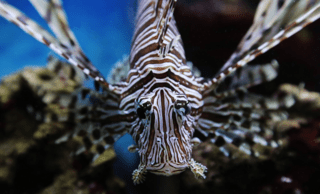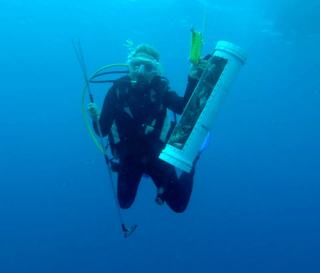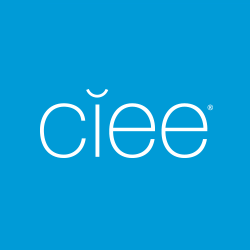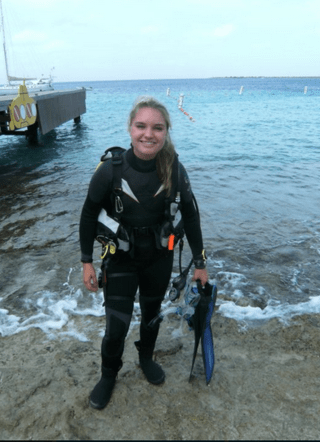Innovative approaches to invasive species management: CIEE Bonaire Alum Erin Spencer and the Millennial Trains Project
CIEE alum Erin Spencer is currently working towards a spot on the Millennial Trains Project to research and share innovative approaches in invasive species management. Erin participated in the CIEE Study Abroad Bonaire – Tropical Marine Ecology and Conservation program in the summer of 2011. We spoke with her about how her CIEE program informed her career path and her current work with invasive species management.
Why did you choose to study in Bonaire with CIEE?
I’ve always loved the oceans, but my Intro to Marine Science class my freshman year of college left something to be desired – it’s just not the same learning about the ocean from behind a desk. I wanted more of a hands-on approach. I searched through dozens of marine science study abroad programs, and CIEE had everything I was looking for, particularly a chance to try my hand at underwater fieldwork. The fact that the program was on a gorgeous tropical island was just a bonus.
I learned a lot of practical skills, such as how to set an underwater transect, do a fish survey, write a lab report, take water samples, identify coral species, and more. But the most important thing I gained from my time in Bonaire was the confidence that I wanted to pursue marine science as a career.
How did you first become interested in invasive species – and lionfish?
I saw my first lionfish while diving off the coast of Florida in 2009, but my real interest in studying invasive species came from my time in Bonaire with CIEE. We attended a talk about invasive lionfish management strategies on the island, and even assisted a researcher with her lab work looking at lionfish stomach contents. My interest in invasive management stayed with me long after I returned to the United States, and I began brainstorming ways to delve further into the problem.
Lionfish are predatory creatures, native to Pacific and Indian oceans that are harming the ecosystem of coastal regions from North Carolina across the Caribbean. For more information, check out a recent NPR article about divers’ efforts to control the lionfish populate at the CIEE Research Station in Bonaire.

What did you learn about during your time in Bonaire with CIEE?
My study abroad in Bonaire was the first time I ever got to do marine science fieldwork, and I completely fell in love. I learned a lot of practical skills, such as how to set an underwater transect, do a fish survey, write a lab report, take water samples, identify coral species, and more. But the most important thing I gained from my time in Bonaire was the confidence that I wanted to pursue marine science as a career. My first week there, I remember we went on a night dive to watch the bioluminescent spawning of some invertebrates, and I was just beside myself with excitement – that night I emailed my parents and described the dive as “the coolest thing I’ve ever done in my life”.
What is the Millennial Train Project? Why do you want to participate?
The Millennial Trains Project is a unique initiative that takes twenty young innovators on a cross-country train journey to explore America’s frontiers while furthering a project of their choice. The whole idea is this: the world has big problems, and it’ll take big ideas to solve them. The train gets young thinkers together to explore the country, collaborate with one another, and brainstorm ways to tackle those big issues. MTP also has incredible partners that provide resources and mentorship along the way, including Fulbright, National Geographic Traveler, and the State Department. This year’s journey goes from L.A. to Washington, D.C., and stops in San Antonio, Austin, New Orleans, and Atlanta.
In each stop on the journey, I will interview locals who are tackling the problem, one invasive species at a time.
For my project, I want to highlight innovative approaches to invasive species management. Invasive species are wreaking havoc in every corner of the world, causing $1.4 trillion in damage annually. In each stop on the journey, I will interview locals who are tackling the problem, one invasive species at a time. I’ve identified six different management projects in each of the six stops, involving chefs, storeowners, professors, students, and more. I want to tell their stories. I will photograph and record each of my interviewees, and blog about my experiences along the way. The project will culminate in a large photo series and a number of articles of my findings.
Photo: Erin Spencer
How can the CIEE Alumni community help with your project?
All participants are required to raise their funds through crowdsourcing, and I have until February 28th to secure my spot on the train by raising $5,000. All donations can be made online, and you won’t be charged unless I meet my fundraising goal. Any support from the CIEE community (including sharing the project with your networks) would be greatly appreciated – every dollar counts!)
To show our support, CIEE has committed to matching alumni donations dollar-for-dollar up to $1000. If you donate $10, $25, or more to Erin’s campaign, from February 9th – 20th, send an email to alumni@ciee.org to let us know and CIEE will match your donation.
Visit Erin’s campaign website here.
Are you a CIEE alum with a project that you’d like to promote or help receive funding? We’d love to hear about it! Contact Dan Olds, Director of Alumni & Constituent Relations, at dolds@ciee.org.


